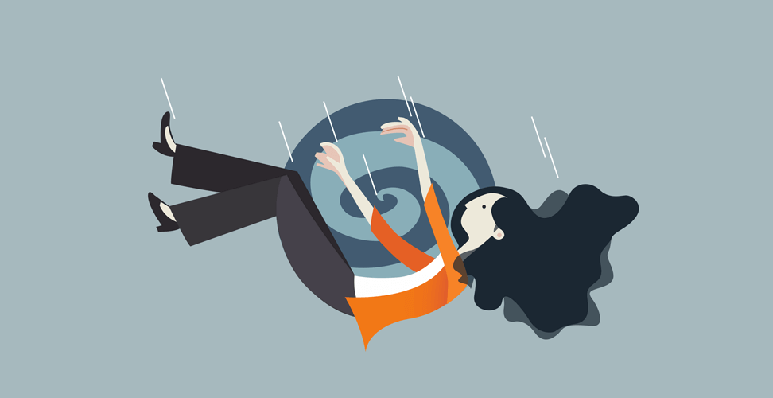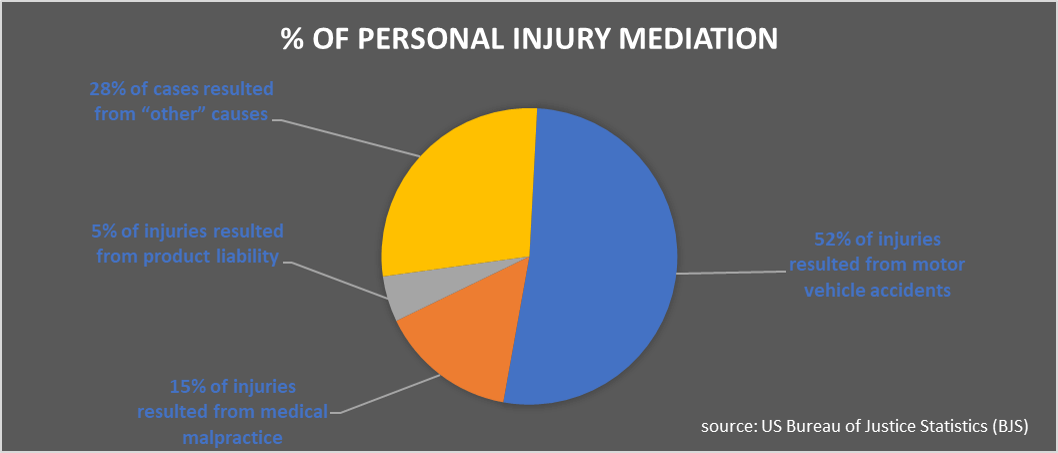Personal Injury Mediation : The Definitive Guide

1. What percentage of cases settled through mediation? It's around 97%
Before discussing the details of personal injury mediation, it’s helpful to get a sense of the scale of the issue.
Exact data doesn’t exist, but based on a Department of Justice estimate, 16,397 tort cases were tried nationally. Since only 4% of cases go to trial, it is reasonable to extrapolate that the actual number of personal injury cases is a staggering 409,925.
The Department of Justice also found:
- 52% of injuries resulted from motor vehicle accidents
- 15% of injuries resulted from medical malpractice
- 5% of injuries resulted from product liability
- 28% of cases resulted from “other” causes
Luckily, few of these cases go to trial thanks, in part, to Alternative Dispute Resolution (ADR) processes like mediation. Personal injury is already a type of dispute very common to mediate. In fact, 97% of personal injury cases settle out of court, mostly through mediation.

2. What's mediation in a personal injury case?
Mediation is a form of ADR where a professional third party – the mediator – helps two or more disputants collaboratively resolve their differences. Mediation is typically a less formal process than arbitration, with discussions usually taking place in a neutral location.
The role of the mediator is not to make decisions for the disputants, rather, it is to add structure to the process, ensuring all parties have equal opportunity to explain their position and express their concerns.
Related to business, personal injury cases most often come in the form of torts and injuries caused by defective products.
3. Is personal injury Mediation Mandatory?
Like Workers Compensation mediation, whether or not personal injury mediation is mandatory for you will depend on where you’re located and the details of your case. Many courts do require mediation, and judges have great discretion in whether to order it.
4. What Happens at Personal Injury Settlement Mediation?
- Before the session starts, the mediator will typically introduce themselves to all parties attending. They will also ensure that everyone in the room knows each other and their role in the case.
- Generally, the defense attorney and claims adjuster are part of the process, but the alleged at-fault party or the defendant may not be. However, in some cases they are required to attend or may choose to come.
- It is customary for everyone attending the meeting to sign confidentiality agreements before it begins. Unlike a trial, all mediation negotiations are confidential. This way, no one has to worry about saying something that can be used against them if the dispute goes to trial.
- Some mediators start the process with the lawyer for the plaintiff (the injured party) giving an opening statement. It could be anywhere from a few minutes to a few hours long depending on the information the lawyer chooses to present. This may be followed by the defense lawyer’s opening statement. Other mediators believe such statements start things off combatively and do not allow opening statements.
- The next step may be a joint session, but eventually the mediator will separate the parties into two rooms. The mediator then goes between rooms to discuss the case, including the strengths and weaknesses of the various positions and settlement demands and offers.
- If a settlement is reached, both parties must sign a written agreement to document the terms. Then, the attorneys will prepare the necessary paperwork and file it with the court. Finally, the plaintiff signs a release, and the case is over.
5. How to prepare for your personal injury mediation?
To give yourself the best chance of finding a resolution, you need to spend time preparing for what to expect at a personal injury mediation.
There are several things to keep in mind going into mediation:
a- You’ll hear statements you disagree with
If opening statements are allowed, the attorneys get a chance to present their case. The attorney of the opposing side is there to make statements that challenge your views of the situation. So don’t be offended; they are just doing their job.
You’ll get plenty of opportunity to share your perspective as negotiations continue.
b- It will feel like you’re not on the same page in the beginning
If you’re the plaintiff (the injured party), you can assume that you’ll receive “low ball” offers from the defense. And equally, the defense can expect your starting point to be too high. It’s ok; the point of a negotiation is to find a comfortable place for both parties to compromise.
c- It’s going to take time
While mediation is much faster than going through a trial, the results aren’t instant. A successful mediation usually takes anywhere from a few hours to a full day. In some cases, multiple sessions are needed.
d- The mediator isn’t on your side...or the other person’s side
The mediator’s role isn’t to advocate for you or the other party, that’s what an attorney is for. The mediator is strictly there to help move the negotiations toward a settlement.
e- Compromise is crucial
Without a willingness to compromise, a mediation is doomed to fail. The process requires both sides to give and take to maximize the outcome for both parties.
6. Does personal injury mediation work?
As mentioned in the introduction of this article, only about 4% of personal injury cases in the U.S. go to trial. The other 96% settle out of court using ADR methods like mediation.
For cases that do make it to trial, the prospects are bleak. Experts report that approximately 90% of personal injury plaintiffs who go to trial lose.
If you reach an impasse with the claims adjuster, mediation could be what you need to break through. It puts a human face to the claim and has the added advantage of a neutral party to facilitate the negotiation.
7. Conclusion
Personal injury mediation offers several advantages over the court system:
It is:
- Faster
- Private
- Easier to schedule
- Personal
- More flexible
- Less expensive
- A process that allows parties to retain control
When negotiations break down, mediation is a good option to get parties talking. It’s usually a voluntary process, but there are some situations when mediation is mandatory.
Mediation is worthwhile, because it has a high success rate and can save time and money versus going to trial.
If you need to find a personal injury mediator you can trust, take a look at our directory to find mediators in your area, and ask them for more information.
Is there something that helped you through an injury mediation case? Let’s continue the conversation in the comment section below!

